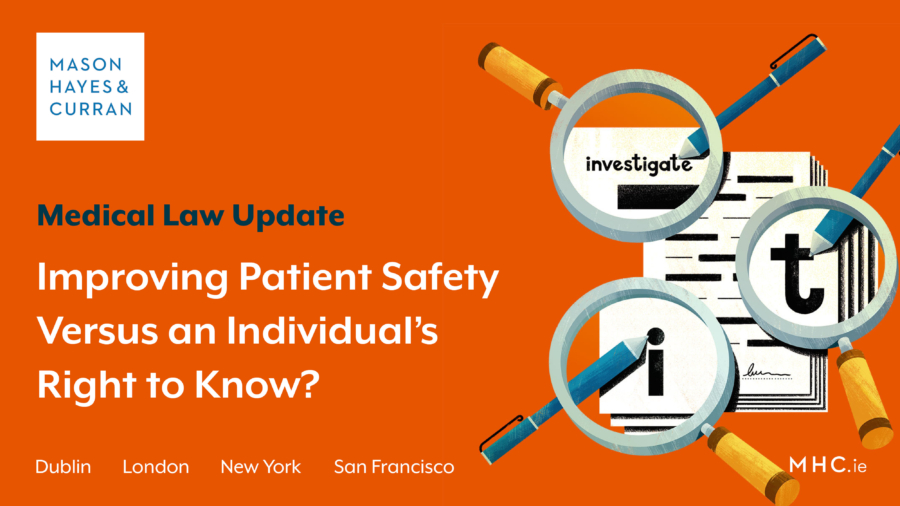Improving Patient Safety Versus an Individual’s Right to Know?

In a recent medical negligence case[1], the court considered whether statements made by hospital staff to a risk management enquiry could justifiably be disclosed to a patient. The court had to strike a balance between (a) the rights of the patient to find out the truth of what happened, and (b) the common good in improving patient outcomes by ensuring that staff are as candid as possible to a risk management enquiry.
Background
The plaintiffs in this case were the parents of a child who sadly died shortly after birth. The parents sued the hospital in relation to the treatment provided during the birth. The hospital had conducted a risk management enquiry into the circumstances of the birth. While the parents were provided with the enquiry’s report, they were not provided with the statements made to the enquiry. The parents believed that these statements would assist them in establishing negligence against the hospital. They argued that the administration of justice and, in particular, getting to the truth of what happened during the birth, should take precedence over the confidentiality of any statements made to the enquiry.
The hospital contended that it is in the public interest that hospital staff who make statements to a risk management enquiry should know that they will not be disclosed. The hospital claimed that if staff cannot be assured that their statements will not be disclosed in any future litigation, then risk management enquiries aimed at improving future patient care will be completely undermined.
The court noted that in order for the statements to be disclosed, they must be both relevant and necessary.
- Relevant: The court held that there is little doubt that the statements are likely to be relevant given that they relate to the labour and birth, which the parents allege were negligently handled by the hospital.
- Necessary: The court then had to consider whether the statements made by clinicians to a risk management enquiry, although relevant, are necessary or whether any exceptions applied.
The main case considered by the court was O’Callaghan v Mahon[2]. In this case, the Supreme Court first considered whether the disputed material was confidential and secondly, whether the public interest would favour disclosure or non-disclosure.
Applying this test to the current case, the court noted that there is no dispute regarding the fact that staff were told that their statements to the enquiry would be treated as confidential. The court also referred to a document issued by the HSE entitled ‘Incident Management Framework’. That particular document clearly establishes that the purpose of hospital enquiries is to improve patient safety and that systems should be put in place to ensure confidentiality.
The court then moved on to consider where the public interest lay. The court noted that there is a conflict in this case between the public interest in ensuring confidentiality of staff statements to a risk management enquiry, and the public interest in the administration of justice for parties seeking disclosure.
Decision
The court ultimately decided that the balance of justice favoured not disclosing the statements. It emphasised that it is in the public interest that hospital staff can be completely open and forthcoming to a risk management enquiry so as to improve patient care in the future.
The court noted specifically that the enquiry in issue was an ad hoc enquiry with no power to compel the attendance of witnesses. The court’s view was that a risk management enquiry would fail as an effective method of improving patient safety, if hospital staff, who were assured of confidentiality, were to discover that their statements would be disclosed in subsequent litigation. The court noted that if this were to be the position, staff in hospitals might be reluctant to participate in risk management enquiries designed to improve future patient outcomes.
Conclusion
The tension between a litigant’s right to find out what happened in the past on the one hand and the public interest of improving future patient care on the other hand was at issue in this case. When tensions like this arise, it is a court’s role to strike the fairest balance possible between the parties. The court ultimately denied disclosure of the contested statements to ensure that there is no disincentive to full and open participation in a hospital’s risk management enquiry. This judgement is important for healthcare providers as it confirms the importance of confidentiality of staff statements made to hospital risk management enquiries.
For more information on issues pertaining to the running of risk management enquiries, contact a member of our Medical Law team.
The content of this article is provided for information purposes only and does not constitute legal or other advice.
[1] O'Keeffe & Anor v Governor and Guardians of the Hospital for the Relief of the Poor Lying in Women Dublin, High Court, Twomey J, 26 July 2022, [2022] IEHC 463
[2] O’Callaghan v. Mahon [2006] 2 I.R 32
Share this:





